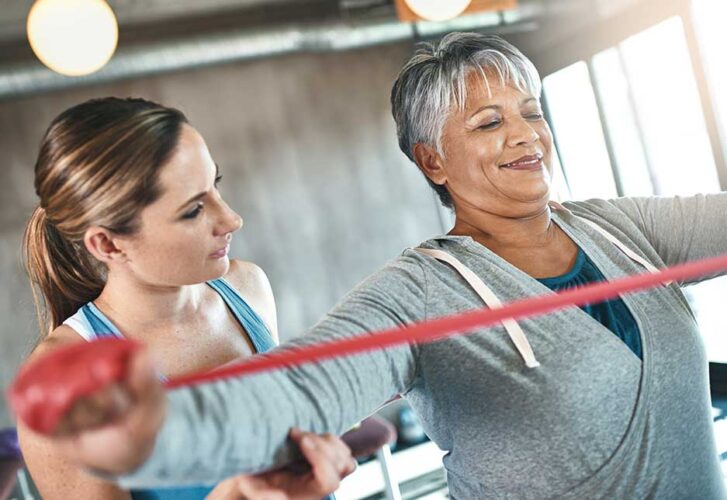
Starting a career as a personal trainer for seniors can be immensely rewarding, presenting unique challenges and opportunities to make a significant impact in the lives of older adults.
With the right approach, knowledge, and skills, you can help seniors maintain their health, increase their mobility, and improve their quality of life. This article outlines essential tips for those looking to specialize in this area of fitness.
Understanding the Unique Needs of Senior Clients
Physical Considerations
To create effective and safe workout plans for seniors, you first need to acknowledge their unique physical needs and limitations. It’s important to have a thorough understanding of common age-related conditions such as arthritis, osteoporosis, and cardiovascular issues.
Training should focus on low-impact exercises that reduce the risk of injury and cater to the physical capabilities of the individual.
Medical Considerations and Precautions
Seniors may have various medical conditions and medications that can affect their ability to exercise safely. Personal trainers must have a thorough understanding of their clients’ medical history, including any chronic illnesses, past injuries, surgeries, or medications.
They should be able to adapt workout plans accordingly, taking into account any contraindications or precautions related to specific health conditions.
Communication with healthcare providers may be necessary to ensure that exercise programs align with medical recommendations and guidelines for senior clients. Additionally, trainers should be vigilant for signs of distress or discomfort during workouts and know how to respond appropriately to medical emergencies that may arise.
Cognitive Factors
Cognitive decline can also be a concern when working with older populations. As a personal fitness instructor for seniors, you should be prepared to use simple, clear instructions and provide a stable and supportive environment to ease any anxiety or confusion during workouts. Patience and empathy are crucial in these interactions.
Specialized Training and Certification
To effectively train senior clients, you might require specialized certifications in senior fitness. These programs provide knowledge about the aging process, the latest research on senior fitness, and specific strategies for designing workout routines that are both safe and effective.
Developing a Safe Workout Environment
Accessibility and Safety
Use a safe and easy-to-access training environment. Some considerations here include secure, non-slip floors, good lighting, and easily accessible equipment. Safety should always be the top priority, and the workout area should be equipped to handle any special needs that seniors might have.
Equipment and Tools
Use equipment that is appropriate for older adults. Resistance bands, light weights, and stability balls are excellent tools for seniors as they help improve strength and balance without putting too much strain on the body.
Incorporating a Holistic Approach
Focus on Flexibility and Balance
Flexibility and balance decrease with age, increasing the risk of falls. Incorporate exercises that enhance these aspects to help seniors improve their mobility and reduce their risk of injuries. Tai Chi and yoga are great options in this regard as they focus on slow, controlled movements that are perfect for improving both balance and flexibility.
Cardiovascular Health
To help clients in their golden years maintain good cardiovascular health, include low-impact cardio exercises like walking, swimming, or cycling in their routines. These activities help maintain heart health without putting excessive stress on their bodies.
Strength Training
Strength training is equally important as it helps maintain muscle mass and bone density, which can significantly decline with age. Use light weights or bodyweight exercises to help seniors build strength. It’s important to progress slowly and increase the intensity of workouts gradually based on their individual strength and endurance levels.
Effective Communication Skills
Building Trust and Encouragement
Build a strong rapport with senior clients so that they can feel confident in your abilities and comfortable in your presence. Regular encouragement and positive reinforcement can go a long way in maintaining their motivation and commitment to their fitness goals.
Clear and Concise Instructions
When providing instructions, clarity is key. Use simple, direct language and demonstrate exercises yourself. Be ready to repeat instructions and provide constant feedback to ensure they are performing exercises correctly and safely.
Understanding and Patience
Patience is a virtue, especially when training senior clients. Take the time to listen to their concerns and tailor your sessions to accommodate their feedback. Understanding their limitations and being flexible in your approach will help them feel valued and respected.
Continuing Education and Professional Development
For personal trainers specializing in senior fitness, continuing education helps you to keep up with the ever-evolving science of health and fitness. Staying updated with the latest research, techniques, and safety protocols is essential for providing the best possible care to older clients.
Importance of Lifelong Learning
Continuing education courses specifically designed for training seniors can deepen your understanding of the physiological and psychological changes associated with aging. These courses often cover topics such as chronic disease management, mental health issues common in older adults, and the latest in nutrition and exercise science for seniors.
Leveraging Workshops and Seminars
Attending workshops and seminars provides valuable knowledge and networking opportunities with other professionals who specialize in this fitness category. These events are great platforms to exchange ideas, learn from experienced trainers, and discover new tools and resources that can improve your training programs.
Marketing Your Services to Seniors
Marketing your services requires a strategy that resonates with both older adults and their families, who often help make decisions regarding their care.
Implement Targeted Marketing Strategies
Figure out where to find your target demographic and how to communicate with them effectively. Utilize platforms like community centers, senior clubs, and online communities to help raise awareness of your services. Tailor your marketing materials to address common health concerns, such as improving balance, flexibility, and overall mobility, to attract clients.
Building an Online Presence
A professional website that highlights your specialization in senior fitness, along with client testimonials and a blog that shares relevant health tips for seniors, can build your credibility. Engaging with your community through social media platforms tailored to an older audience, like Facebook, can also be effective.
Creating a Supportive Community
Building a community around your senior clients can enhance their training experience and encourage persistence in their fitness goals. Group training sessions, social fitness activities, and wellness workshops are excellent ways to foster a community.
Benefits of Group Sessions
Group sessions make training more enjoyable and provide social interaction, which is vital for mental health. These sessions can help seniors feel more connected, reducing feelings of isolation and improving their overall well-being.
Wellness Workshops
Offering workshops on topics relevant to senior health, such as nutrition for aging adults, managing arthritis pain through exercise, or cognitive health maintenance, can add value to your services and reinforce your commitment to their health.
NPTI Florida Can Equip You for Success
Being a personal trainer for seniors comes with a unique set of challenges. Our Personal Fitness Training and Advanced Personal Fitness Training programs at NPTI Florida provide comprehensive training that includes specific modules on senior fitness.
These programs offer everything you need to get practical skills for addressing the diverse needs of older adults safely and effectively.
As an ACCSC-accredited institution, we emphasize a blend of theoretical knowledge and practical application. We thus prepare our graduates to create specialized fitness programs that promote longevity and improve the quality of life for their senior clients.
Building a Successful Career
Becoming a personal trainer for seniors is a fulfilling career path that allows you to make a significant impact on the health and wellness of older adults.
By understanding the unique needs of your clients, continually educating yourself on the best practices in senior fitness, effectively marketing your services, and creating a supportive community, you can build a successful career in this specialty.
With the right training and approach, you can help your senior clients enjoy a safer, more active, and healthier lifestyle.

